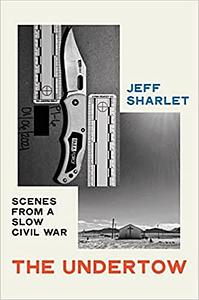Take a photo of a barcode or cover
challenging
dark
emotional
informative
sad
medium-paced
It wasn’t what I expected. I wanted to read something with more facts and general trends than following a couple individuals. It may change later on in the book, but the beginning was notwhat I wanted to read.
dark
emotional
reflective
tense
medium-paced
challenging
dark
reflective
tense
medium-paced
challenging
dark
informative
sad
tense
fast-paced
dark
emotional
informative
reflective
sad
dark
informative
reflective
sad
medium-paced
informative
reflective
sad
slow-paced
informative
medium-paced
challenging
dark
reflective
tense
slow-paced
I struggled with this book. I appreciated the ethos behind it- it's essentially an American road trip book colored by conversations journalist Jeff Sharlet has with the people he encounters: religous zealots, January 6 rioters, men's rights activists, and many others. I sense a real drive for answers from Sharlet- he approaches these discussions with curiosity and care and puts himself in many uncomfortable situations to get closer to the understanding he's seeking. However, I think this book needed more of an argument or a conclusion (if not for the book as a whole, then in the context of individual chapters). Reading this book felt like swimming in deep water, and I wanted Sharlet to create some islands for me to rest on. I just didn't feel like I gained much more of an understanding of the subject from reading this book- maybe that's to be expected. His discussions on Gnosticism and the prosperity gospel movement stuck out the most as fully-fledged analyses.
Sharlet's writing style is also unsual, and I appreciated it in its own way. Although he's a journalist, this book takes a very poetic approach. He leaps in between certain topics and scenes, personal and political, tying them together with conceptual language. I actually admired the style- I just don't think the book as a whole was effective as it could've been. Still, it's a unique and timely read, and it was obviously crafted with deep intentionality.
"It's satisfying when an expert flattens a false claim. That's how so many of us believe we'll resist the undertow of civil war, fact-checking our way back to solid ground. But [...] such corrections miss the point. You can't fact check a myth."
Sharlet's writing style is also unsual, and I appreciated it in its own way. Although he's a journalist, this book takes a very poetic approach. He leaps in between certain topics and scenes, personal and political, tying them together with conceptual language. I actually admired the style- I just don't think the book as a whole was effective as it could've been. Still, it's a unique and timely read, and it was obviously crafted with deep intentionality.
"It's satisfying when an expert flattens a false claim. That's how so many of us believe we'll resist the undertow of civil war, fact-checking our way back to solid ground. But [...] such corrections miss the point. You can't fact check a myth."



